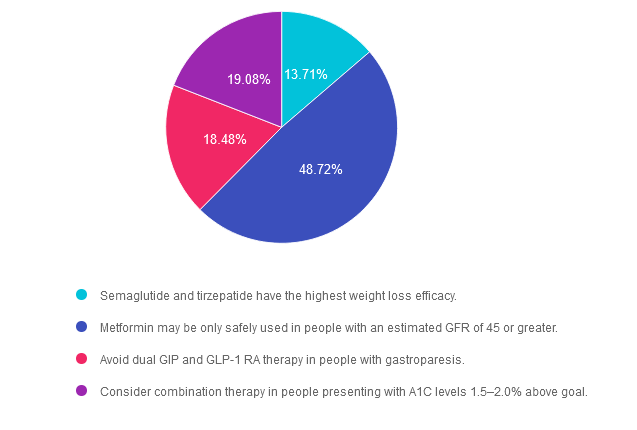
For last week’s practice question, we quizzed participants on the new ADA Standards for type 2 diabetes medication. 49% of respondents chose the best answer. We want to clarify and share this important information, so you can pass it on to people living with diabetes and your colleagues, plus prepare for exam success!
Before we start though, if you don’t want any spoilers and haven’t tried the question yet, you can answer it below: Answer Question
Based on the newly released 2024 American Diabetes Association (ADA) Standards of Care, which of the following statements is NOT accurate regarding treatment for hyperglycemia?
Answer Choices:
- Semaglutide and tirzepatide have the highest weight loss efficacy.
- Metformin may be only safely used in people with an estimated GFR of 45 or greater.
- Avoid dual GIP and GLP-1 RA therapy in people with gastroparesis.
- Consider combination therapy in people presenting with A1C levels 1.5–2.0% above goal.

Getting to the Best Answer
If you are thinking about taking the certification exam, this practice test question will set you up for success. Test writers anticipate possible answers based on the details in the question. They will wave those “juicy answers” right under your nose. Your job is to weed through the particulars, pluck out the most important elements and choose the BEST answer.
Answer 1 is incorrect. 13.71% chose this answer. “Semaglutide and tirzepatide have the highest weight loss efficacy.” This statement is accurate. These two incretin mimetics not only substantially lower A1C levels, they also are associated with the highest percentage of weight loss of all the diabetes medications. See Diabetes Med PocketCards for more information.
Answer 2 is correct. 48.72% of you chose this answer. “Metformin may be only safely used in people with an estimated GFR of 45 or greater.” YES, great job! This answer is FALSE (making it the best answer). If a person with diabetes is taking metformin and their GFR drops below 30, then we stop the medication. However, we can start or continue metformin therapy if the GFR is 45 or greater. In addition, metformin doesn’t harm the kidneys, it actually protects them by lowering blood glucose levels. See Diabetes Med PocketCards for more information.
Answer 3 is incorrect. About 18.48% of respondents chose this. “Avoid dual GIP and GLP-1 RA therapy in people with gastroparesis.” This answer is also accurate. Tirzepatide (Mounjaro) can substantially slow gastric emptying which could exacerbate gastroparesis. For that reason, it is not a recommended therapy for people with gastroparesis.
Finally, Answer 4 is incorrect. 19.08% chose this answer. “Consider combination therapy in people presenting with A1C levels 1.5–2.0% above goal.” This answer is also accurate. The ADA Standards of Care recommend more intensive pharmacologic intervention for those with substantially elevated A1C to improve and prolong pancreatic function.
We hope you appreciate this week’s rationale! Thank you so much for taking the time to answer our Question of the Week and participate in this fun learning activity!
Want to learn more about this question?
ADA Standards of Care Course 2024
Airs Live February 1, 2024 at 11:30 AM PT

Topics:
- A review of changes & updates to the annual ADA Standards of Medical Care in Diabetes.
- Identification of key elements of the position statement.
- Discussion of how diabetes educators can apply this information in their clinical setting
This course, updated annually, is an essential review for anyone in the field of diabetes. Join Coach Beverly as she summarizes the annual updates to the American Diabetes Association’s (ADA) Standards of Medical Care in Diabetes & provides critical teaching points & content for healthcare professionals involved in diabetes care & education.
Can’t make it live? No worries. We will send post the recorded version to the Online University within 24 hours of the broadcast
Instructor: Beverly Thomassian RN, MPH, CDCES, has been Board Certified in Advanced Diabetes Management for over 20 years. She is an Associate Clinical Professor at UCSF, a working educator, and a nationally recognized diabetes expert. She has a Master’s Degree in Public Health from UCLA, with a focus on behavioral health and education.
Sign up for Diabetes Blog Bytes – we post one daily Blog Byte from Monday to Friday. And of course, Tuesday is our Question of the Week. It’s Informative and FREE! Sign up below!
Accreditation: Diabetes Education Services is an approved provider by the California Board of Registered Nursing, Provider 12640, and our CPEU courses have received Prior Approval* from the Commission of Dietetic Registration (CDR), Provider DI002. Since our CPEU courses received Prior approval* from the CDR, these CPEU courses satisfy the CE requirements for the CDCES /BC-ADM regardless of your profession!
The use of DES products does not guarantee the successful passage of the certification exam. CBDCE and ADCES do not endorse any preparatory or review materials for the CDCES or BC-ADM exams, except for those published by CBDCE & ADCES.









